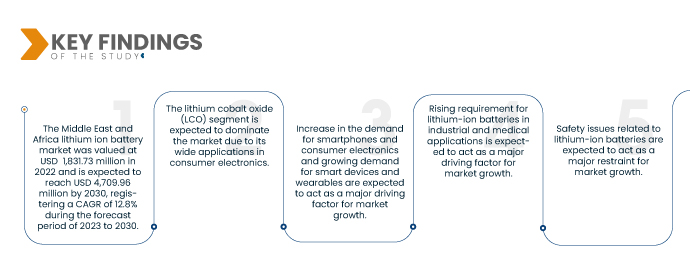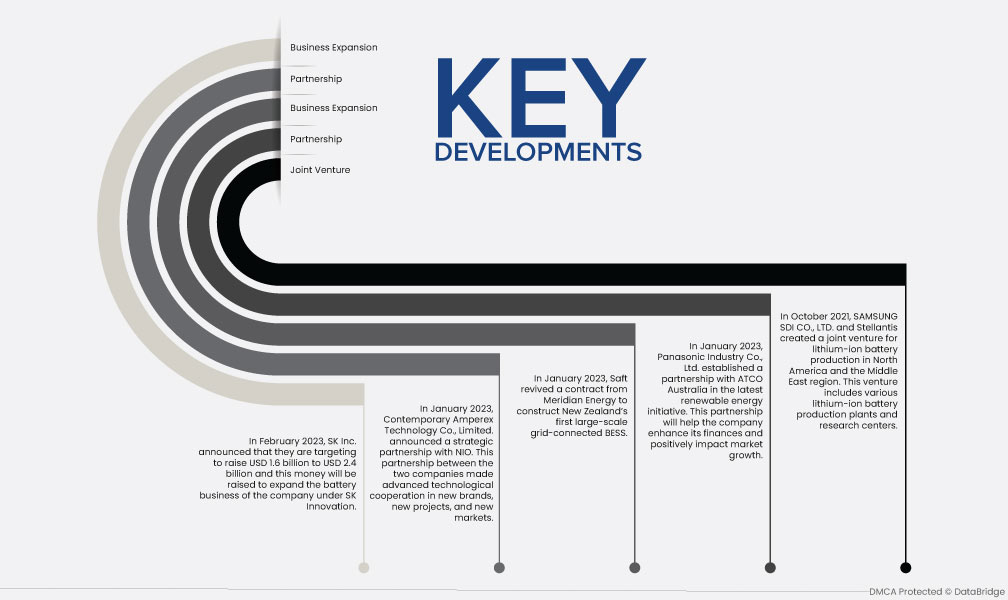The demands and requirements of consumer electronics have continued to increase at an exponential rate. Lithium ion batteries are common in consumer electronics. They are one of the most popular types of rechargeable batteries for portable electronics, with proper energy-to-weight ratios, high open-circuit voltage, and low self-discharge rate. Advancements in technology have compacted the size of electronic devices, making them slimer and lighter, which is increasing the requirement for lithium ion batteries. These batteries last longer, charge faster, and have a higher power density for more battery life in a lighter package.
Moreover, 1 kg of a lithium ion battery can store up to 150 watt-hours of electricity whereas the lead-acid battery can store only 25 watt-hours per kg. The benefits offered by lithium ion batteries have increased the requirement in consumer electronics. Moreover, as people are becoming more inclined towards digitalization, more advanced electronics are being developed. Hence, an increase in demand for smartphones and consumer electronics is expected to boost the market growth.
Access Full Report @ https://www.databridgemarketresearch.com/reports/middle-east-and-africa-lithium-ion-battery-market
Data Bridge Market Research analyzes that the Middle East and Africa Lithium Ion Battery Market size was valued at USD 2.36 billion in 2024 and is projected to reach USD 6.98 billion by 2032, with a CAGR of 14.7% during the forecast period of 2025 to 2032.
Key Findings of the Study
Growing Demand for Smart Devices And Wearable
Lithium ion battery manufacturers are producing more flexible batteries that can be bent and rolled. These features offered by manufacturers have increased the requirement for smart devices and wearables. The use of batteries was until now limited to bulky and rigid forms, which have been changed with more advancing technologies and through R&D. In addition, with the increasing growth in IoT and 5G, the adoption of smart devices has increased, which has led to the market growth.
Report Scope and Market Segmentation
|
Report Metric
|
Details
|
|
Forecast Period
|
2025 to 2032
|
|
Base Year
|
2024
|
|
Historic Years
|
2023 (Customizable to 2016-2021)
|
|
Quantitative Units
|
Revenue in USD Billion
|
|
Segments Covered
|
Type (Lithium Cobalt Oxide (LCO), Lithium Nickel Manganese Cobalt Oxide (Li-NMC), Lithium Nickel Cobalt Aluminum Oxide (NCA), Lithium Manganese Oxide (LMO), Lithium Titanate Oxide (LTO), Lithium Iron Phosphate (LFP)), Components (Cathode, Anode, Electrolyte, Separator, and Others), Capacity (3000 mAh to 10000 mAh, 10000 mAh to 60000 mAh, O to 3000 mAh, and 60000 mAh & above), Voltage (Low (Below 12V), Medium (12V-36V), and High (Above 36V)), Product (Cells, Pack, Energy Storage System (ESS), Module, and Others), End User (Consumer Electronics, Automotive, Industrial, Energy and Power, Medical, and Others)
|
|
Countries Covered
|
U.A.E., South Africa, Saudi Arabia, Egypt, Turkey, Israel, Qatar, Kuwait, Oman, Iraq, Jordan, Lebanon, Georgia, Armenia, Yemen, and Rest of Middle East & Africa
|
|
Market Players Covered
|
LG Chem (South Korea), Contemporary Amperex Technology Co., Limited (China), Panasonic Industry Co., Ltd. (Japan), BYD Company Ltd. (China), SAMSUNG SDI (South Korea), Saft (France), Lithium Energy Japan (Japan), VARTA AG (Germany), Amperex Technology Limited (China), GlobTek, Inc. (U.S.), Leclanché SA (Switzerland), LITHIUMWERKS (Netherlands), TOSHIBA CORPORATION (Japan), Xiamen Tmax Battery Equipments Limited (China), Jiangxi JingJiu Power Science & Technology Co.,LTD. (China), Shenzhen Grepow Battery Co., Ltd. (China), Shuangdeng Group Co,Ltd (China), Codi Energy Ltd. (China), Exide Technologies (U.S.), and SK Inc. (South Korea) among others
|
|
Data Points Covered in the Report
|
In addition to the insights on market scenarios such as market value, growth rate, segmentation, geographical coverage, and major players, the market reports curated by the Data Bridge Market Research also include depth expert analysis, patient epidemiology, pipeline analysis, pricing analysis, and regulatory framework.
|
Segment Analysis
Middle East and Africa lithium ion battery market is segmented into six notable segments based on type, components, capacity, voltage, product, and end use.
- Based on type, the Middle East and Africa lithium ion battery market is segmented into Lithium Cobalt Oxide (LCO), Lithium Nickel Manganese Cobalt Oxide (Li-NMC), Lithium Nickel Cobalt Aluminum Oxide (NCA), Lithium Manganese Oxide (LMO), Lithium Titanate Oxide (LTO), and Lithium Iron Phosphate (LFP)
In 2025, the Lithium Cobalt Oxide (LCO) segment is expected to dominate the Middle East and Africa lithium ion battery market
In 2025, the Lithium Cobalt Oxide (LCO) segment is expected to dominate the market with a market share of 39.60% due to its high energy density and reliability in powering compact, high-performance devices and electric vehicles.
- Based on components, the Middle East and Africa lithium ion battery market is segmented into cathode, anode, electrolyte, separator, and others
In 2025, the cathode segment is expected to dominate the Middle East and Africa lithium ion battery market
In 2025, the cathode segment is expected to dominate the market with a market share of 46.45% due to its critical role in determining battery performance, energy density, and overall efficiency for various applications.
- Based on capacity, the Middle East and Africa lithium ion battery market is segmented into 3000 mAh to 10000 mAh, 10000 mAh to 60000 mAh, O to 3000 mAh, and 60000 mAh & above. In 2025, the 3000 to 10000 mAh segment is expected to dominate the market with a market share of 48.57%
- Based on voltage, the Middle East and Africa lithium ion battery market is segmented into low (below 12V), medium (12V-36V), and high (above 36V). In 2025, the low (below 12V) segment is expected to dominate the market with a market share of 57.00%
- Based on product, the Middle East and Africa lithium ion battery market is segmented into cells, pack, Energy Storage System (ESS), module, and others. In 2025, the cells segment is expected to dominate the market with a market share of 45.92%
- Based on end user, the Middle East and Africa lithium ion battery market is segmented into consumer electronics, automotive, industrial, energy and power, medical, and others. In 2025, consumer electronics segment is expected to dominate the market with a market share of 39.01%
Major Players
Data Bridge Market Research analyzed LG Chem (South Korea), Contemporary Amperex Technology Co., Limited (China), Panasonic Industry Co., Ltd. (Japan), BYD Company Ltd. (China), SAMSUNG SDI (South Korea) act as the major players operating in the Middle East and Africa lithium ion battery market.
Market Developments
- In November 2023, BYD Company ltd. demonstrated its strategic expansion into the Middle East, leveraging partnerships with Chinese automotive firms such as BeyonCa, Pony.ai, and Nio to access lucrative markets in Saudi Arabia and the UAE. Concurrently, BYD's collaboration with Middle Eastern financial entities such as Mubadala Investment Company and the Saudi Public Investment Fund signals a commitment to deepening economic ties, and fostering growth and innovation within the automotive industry
- In April 2023, Contemporary Amperex Technology Co., Limited condensed battery, boasting up to 500 Wh/kg energy density, revolutionizes aviation electrification, ensuring safety and efficiency. Leveraging biomimetic electrolytes and innovative materials, it overcomes previous limitations, paving the way for mass production and application in electric passenger aircrafts. This breakthrough marks a pivotal moment in achieving universal electrification across transportation sectors, advancing towards global carbon neutrality goals
- In January 2023, Contemporary Amperex Technology Co., Limited announced a strategic partnership with NIO. This partnership of the two companies made advanced technological cooperation in new brands, new projects, and new markets, improved supply-demand coordination, propelled overseas expansion, and developed the business model centering on long-service life batteries
- In January 2023, the LG Chem project won the FDI deal of the year award. This recognition made a significant impact on the growth of the company's image as well as the growth of the Middle East and Africa lithium ion battery market
- In December 2022, Panasonic Corporation and Lucid Group have agreed to supply lithium-ion batteries for Lucid's luxury EVs, including the Lucid Air and upcoming Gravity SUV. This partnership aims to meet the growing demand for EV batteries, driving growth in the lithium-ion battery industry and advancing towards a net-zero emissions future
Regional Analysis
Geographically, the countries covered in the Middle East and Africa lithium-ion battery market report are U.A.E., South Africa, Saudi Arabia, Egypt, Turkey, Israel, Qatar, Kuwait, Oman, Iraq, Jordan, Lebanon, Georgia, Armenia, Yemen, and Rest of Middle East & Africa.
For more detailed information about Middle East and Africa lithium-ion battery market report, click here – https://www.databridgemarketresearch.com/reports/middle-east-and-africa-lithium-ion-battery-market












